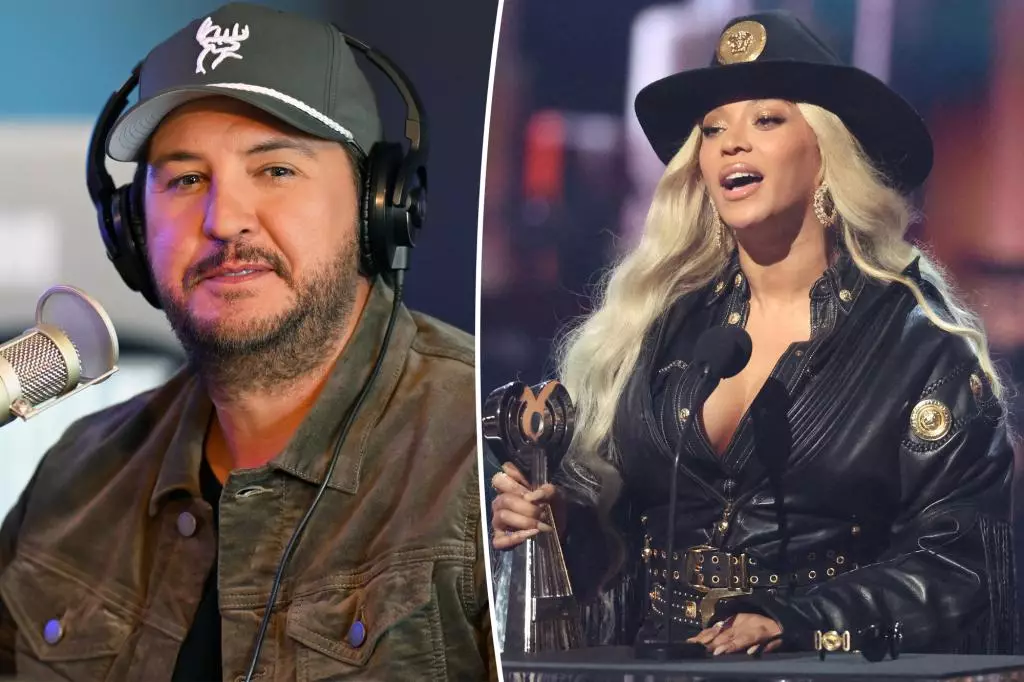In the contemporary music landscape, genre boundaries continue to intersect and create complex discussions about inclusion and recognition. A recent conversation sparked by country music star Luke Bryan illuminates this subject, particularly concerning Beyoncé’s foray into country music with her debut album, “Cowboy Carter.” Despite the album achieving commercial success, questions arise regarding its reception within the Country Music Association (CMA) Awards nominations. Bryan’s remarks emphasize the underlying tension between established country artists and those dipping their toes into the genre from other musical backgrounds.
Bryan, while acknowledging Beyoncé’s talent and her significant fan base, argues that for artists from outside the genre to gain recognition, they must fully integrate into the country music community. His statement, “if you’re gonna make country albums, come into our world and be country with us a little bit,” points to a perceived necessity of authenticity and commitment to the cultural fabric of country music. This sentiment raises an essential question: Is there an implicit gatekeeping within genres that limits the recognition of artists from outside its confines?
Another layer to this discourse involves the passionate reactions of Beyoncé’s fanbase, known as the Beyhive. Bryan acknowledges the fervor of her fans, who fiercely advocate for her deserving recognition in the CMA awards. However, he also notes that merely producing a country album doesn’t guarantee nominations. This reflects a broader trend seen throughout the music industry, where established norms dictate the qualifications for success and acknowledgment.
Beyoncé’s experience is further echoed by fellow artist Kelly Clarkson, who shared her own challenges in crossing genre lines. Clarkson described being pressured to abandon her pop roots to succeed in country music, illustrating that these barriers are not just theoretical but are lived realities for many artists. This underscores a crucial aspect of the conversation surrounding genre: the expectations set forth for artists and their work can often feel restrictive and discriminatory.
While the critiques surrounding Beyoncé’s integration into country music are significant, they must be contextualized within her broader contributions to the music industry. Dolly Parton, a revered figure in country music, also weighed in on the situation, suggesting that the CMA’s voting committee likely favored those committed to the genre long-term. Her remarks stimulate further discussion about the ongoing dynamics of recognition and appreciation within the industry.
Parton’s observations highlight the idea that even when artists venture outside their usual genres, there exists a complex tapestry of expectations tethered to their perceived authenticity. It can be inferred that, for many country-focused audiences, the experience and history of being a “country artist” weigh heavily in award nominations. This begs the question of whether genre should dictate an artist’s eligibility for recognition or if the merit of artistry alone should suffice.
Beyoncé herself has been vocal about her journey into country music, revealing that her motivation was borne from a lack of welcome and understanding. She expressed the desire to create a project that not only reflects her evolution as an artist but also pays homage to the rich history of country music. This perspective serves as an important reminder of the challenges artists face when they challenge genre conventions.
Her documentation of the struggles faced in accessing the country genre sheds light on the systematic barriers to entry that many artists encounter. The criticisms she faced upon releasing her previous country-influenced music further amplify this discussion, illustrating how societal perceptions can pigeonhole artists despite their talents.
The debate surrounding Beyoncé’s role in country music and the CMA Awards invites a broader conversation about the nature of genre itself. Should genre be a rigid classification, or can it be more fluid, enabling cross-pollination among disparate musical styles? As the music industry evolves and the boundaries between genres continue to blur, recognizing and embracing fresh voices becomes increasingly essential.
The complexities encapsulated within this discussion are not exclusive to Beyoncé; they reflect a systemic issue in the music industry that affects countless artists seeking recognition. As such, this dialogue should encourage greater inclusivity and understanding, fostering a community where artists from all backgrounds can thrive without the constraints of traditional genre definitions. As we move forward, it is essential to hold space for diverse musical expressions and the artists who embody them.


Leave a Reply